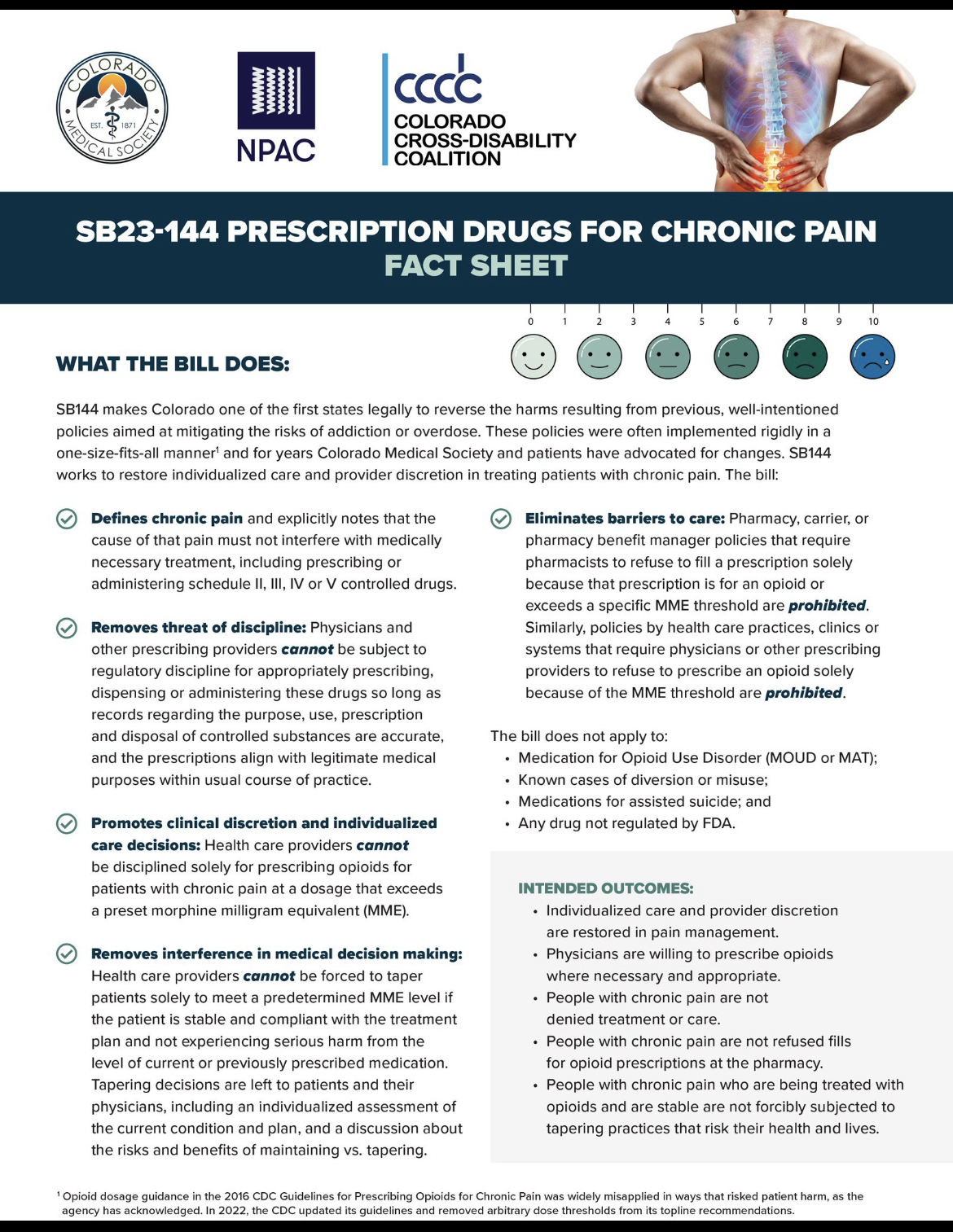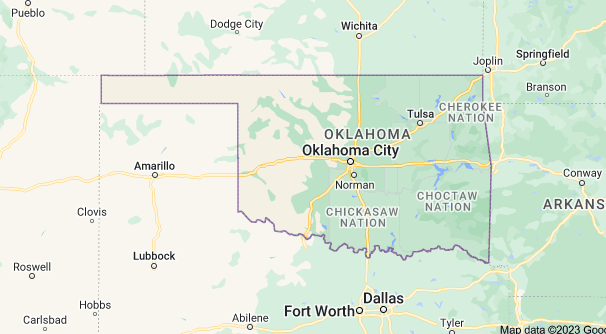- Details
- Hits: 4025
States and Status of Legislation Protecting CPP's and Providers:
- Arizona - Signed into law
- Colorado - Signed into law
- Illinois HB 2046 - In Committee
- Minnesota - Signed into law
- New Hampshire - Signed into Law
- Oklahoma Bill SB57 - Signed into Law
- Rhode Island Bill 384 - Signed into Law
- Details
- Hits: 2219
SB23-144 bill passed and was signed into law in May 2023.
"The bill allows a health-care provider to prescribe, dispense, or administer a schedule II, III, IV, or V controlled substance (drug) to a patient in the course of treatment for a diagnosed condition that causes chronic pain. The bill also clarifies that the prescribing health-care provider is not subject to disciplinary action by the appropriate regulator for prescribing a dosage of a drug that is equal to or more than a morphine milligram equivalent dosage recommendation or threshold specified in state or federal opioid prescribing guidelines or policies.
The bill prohibits a health-care provider from refusing to accept or continue to treat a patient solely on the basis of the dosage of a drug the patient requires for the treatment of chronic pain. A health-care provider is also prohibited from tapering a needed dosage solely to meet a predetermined dosage recommendation.
The bill also prohibits a pharmacist, health insurance carrier, or pharmacy benefit manager from refusing to fill or approve the coverage for a drug solely on the basis of the dosage requirement of a patient."

- Details
- Hits: 1933
Synopsis As Introduced
Amends the Illinois Controlled Substances Act. Provides that decisions regarding the treatment of patients experiencing chronic pain shall be made by the prescriber with dispensing by the pharmacist in accordance with the corresponding responsibility as described in federal regulations and State administrative rules. Provides that ordering, prescribing, dispensing, administering, or paying for controlled substances, including opioids, shall not be predetermined by specific morphine milligram equivalent guidelines. Provides that confidential information received from opioid treatment programs or confidential information otherwise protected under federal confidentiality of substance use disorder patient records shall not be included in the information shared to the central repository under the Prescription Monitoring Program. Provides that an applicant for this information must have a valid court order or subpoena for the confidential information requested. Defines "chronic pain" and "opiates". Effective immediately.
Status - In Committee
Summary- Amends the Illinois Controlled Substances Act. Provides that all decisions regarding the treatment of patients experiencing pain, including chronic pain, shall be made by the prescriber. Provides that ordering, prescribing, dispensing, administering, or paying for controlled substances, including opioids, shall not in any way be predetermined by specific morphine milligram equivalent guidelines. Provides that, before the Department of Human Services releases confidential information from the central repository, the applicant, in addition to other requirements of the Act, must demonstrate in writing to the Department that the applicant has a valid court order or subpoena for the release of the confidential information requested.
- Details
- Hits: 3250
Please join Arizona's Don't Punish Pain Rally page to network with other CPP advocates from Arizona
In April of 2022, Arizona passed a law, Bill SB1162, protecting pain patients.
Dr. Jeffrey Singer testified if favor of the bill
Senator Nancy Barto introduced Arizona SB1162 in January 2022. This new law will give protections to chronic intractable pain patients in Arizona. This amendment to ARS Section 32-3248.01, will improve access to care, give physicians the ability to treat their patients as medically appropriate, and confirm that providers and their state governing boards have oversight on the proper treatment for these patients.
- Details
- Hits: 3289
On June 2, 2021, Rhode Island's Governor Dan McKee signed Bill 384 into law. A copy of the bill can also be found here. Greg Amore, Claudia Merandi's local Representative, fought hard for this bill to pass which protects intractable pain patients from the 2016 CDC Opioid Guidelines. Recently, in March 2022, Arizona also passed legislation that was based on this bill from Rhode Island. That has been Claudia's hope for years, that she could pass a bill in Rhode Island that would trickle down into other states. Practical Pain Management covered this story.
In 2023, Senate Bill 793 Senate Bill 793 passed in Rhode Island. This is an extremely important bill because it protects providers.
Please join Rhode Island's Don't Punish Rally Facebook page to network with other CPP's in Rhode Island.
- Details
- Hits: 2823
CPP advocates in Minnesota have been working hard to pass legislation to protect intractable pain patients.
Video of hearing on March 24, 2022. A CPP and Dr. Beth Darnall testified.
- Details
- Hits: 3338
Please join New Hampshire's Don't Punish Pain Rally Facebook page to network with other advocates from NH.
New Hampshire’s Bill, HB1639, was signed by Governor Sununu in August of 2020. It was originally created as a separate bill, SB 546, but was later added to Omnibus Bill HB1639.
The bill was created and passed with the amazing efforts of Bill Murphy, CPP advocate and original member of Don't Punish Pain Rally. When the bill was signed into law, Bill Murphy created this tweet:
"New Hampshire’s Bill, HB1639, has been signed by Governor Sununu. This Bill addresses the “Treatment of Chronic Pain”. Key sections of this legislation are attached"
- Details
- Hits: 4220
Please join Oklahoma's Don't Punish Pain Rally Facebook page to network with other CPP's in Oklahoma
Oklahoma's Intractable Pain Bill
In April 2021 Oklahoma's Bill SB57 unanimously passed the House and Senate.
Hearing About Harms From Forced Tapers
On November 1, 2021 the Oklahoma, Alcohol, Tobacco, and Controlled Substances Committee held a hearing. The purpose was to discuss an interim study that was done about rapid de-prescribing and the horrific effects it has had on patients. This was requested and organized by Tamera Stewart-P3Alliance Policy Director, Julia Heath-P3Alliance Director of Medical Initiatives, along with their leadership team.
Some of the speakers were Beth Darnall ,PhD from Stanford University, Dr. Vanila Singh, other doctors, a pharmacist, and chronic pain patients.
Beth Darnall, Phd:- "We are exposing vulnerable patients to new health risks by reducing opioid prescriptions."
- "We saw increased health problems, suicidal ideation, suicides, overdose deaths as a consequence or opioid reductions themselves."
- Dr. Darnall mentions this recent Jama study on the association of dose tapering with overdose or mental health crisis among patients prescribed long-term opioids.
- We've failed to implement patient-centered care for our most vulnerable population.
















